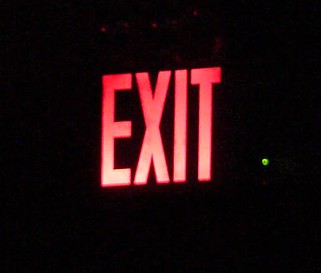When we talk about social networking or contagion effect, we are usually referring to getting good words out about us so that we can engender good will and gain additional customers. In other words, we often focus on positive behavior in the context of social networks. But just as positive behavior can be fostered through social networks, quitting behavior can be social too. When consumers decide to leave a company, even when no particularly negative word-of-mouth is present, that decision can still have a social rippling effect. Consider my recent quitting of Facebook, for instance. That decision was bolstered by seeing 36000+ consumers who also signed up to quit on QuitFacebookDay.com.

Image by Loui Loui from Flickr | CC 2.0
To help understand how this social quitting behavior works, I would like to discuss the findings from a rare academic study on this subject. Published in the Marketing Science Institute’s 2010 Working Paper Series, Irit Nitzan and Barak Libai from Tel Aviv University studied the effect of defection by friends on our own decisions to quit a company. If you are interested in the full report, you can purchase it directly from MSI.
Context
The study is based on the behavior of 853,643 customers of a major cellphone service provider in a Mediterranean country. The communication records and defection behavior of these consumers over the course of one year were examined. Social networks were constructed from the consumers’ call and text messaging records.
Main Findings
- Quitting definitely has a social effect. Having an additional defecting friend increases one’s probability of leaving the same company by as much as 80%.
- This social effect is the strongest right after the friend quits, and dissipates rather rapidly as time passes.
- The stronger the social relationship one has with the quitting friend and the more similar one is to the friend, the stronger the social impact of quitting.
- Heavy users and loyal customers who have been with the company for a long time and heavy users are more immune to the social effect of quitting from defecting friends.
What Does All This Mean to Practice?
- Be proactive when a customer quits. If you have access to the customer’s social network (e.g., through online social networks such as Facebook), engage in preventive measures with the customer’s friends, such as sending an appreciation message to the friends, offering a special promotion, or obtaining feedback to address potential issues.
- Try to respond fast, preferably within the first month, as the social effect of quitting is the strongest at the beginning.
- Fostering customer loyalty does pay off. Loyal customers are much more resistance to forces that may lure them away from your company. This has been found to be the case from not only this study but also other academic studies as well.
Reference:
Irit Nitzan and Barak Libai (2010). Social Effects on Customer Retention Marketing Science Institute Working Paper Series 2010 Report No. 10-107